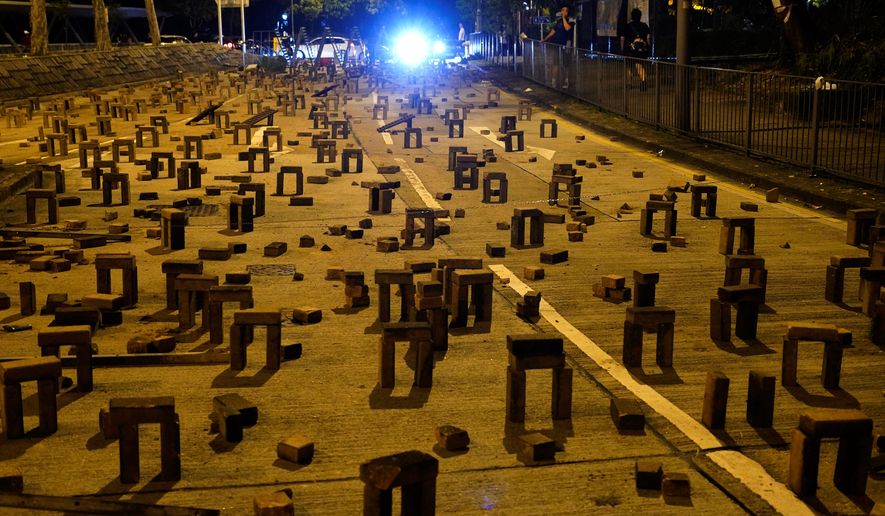The Trump administration and Congress are avoiding harsh rhetoric in backing pro-democracy protests in Hong Kong that have thrown the former British colony into chaos and unnerved the Communist government in Beijing.
New and larger protests of tens of thousands of Hong Kong residents continued Wednesday, including violent clashes with police, following the police shooting of a protester on Monday. Protesters orchestrated demonstrations and boycotts that turned the Chinese University of Hong Kong into what news reports described as a war zone, with police firing tear gas and rubber bullets at protesters.
The protests incapacitated Hong Kong for a third day in a row on Wednesday as auto and train traffic was disrupted, prompting schools and universities to close.
The police shooting marked a significant increase in violence and led to new protests, with further demonstrations set for Thursday.
The protests were triggered by a proposed extradition law that would permit China to extradite Hong Kong residents to the mainland where courts are controlled by Beijing. The protests have continued even after the bill was withdrawn by Hong Kong’s pro-Beijing government.
With the White House in the midst of intense talks with China on a new trade deal, senior U.S. officials made no comment on the shooting Monday. The State Department issued a statement condemning violence by both sides.
Critics on both sides of the political divide say the U.S. is not be doing enough to support the pro-democracy protesters.
Senate Minority Leader Sen. Charles E. Schumer tweeted Wednesday that the U.S. needs “to act on the tragedy unfolding in Hong Kong. Why is President Trump giving the Chinese Communist Party a free hand?”
The New York Democrat added he thinks Senate Majority Leader Mitch McConnell is holding up legislation that would permit sanctions on Hong Kong officials linked to police brutality. The legislation would permit the imposition of property and visa-blocking sanctions on officials responsible for human rights violations.
China’s government repeated accusations on Wednesday that the United States of fomenting the pro-democracy protests.
“We urge the U.S. to clearly assess the situation and pull back before it’s too late. The U.S. side must immediately stop pushing the relevant bills, stop supporting violent offenses, and stop using Hong Kong to interfere in China’s domestic affairs,” Chinese Foreign Ministry Spokesman Geng Shuang said in Beijing.
China absorbed Hong Kong in 1997 and agreed to permit the former colony to keep its system as long as it remained part of China. The policy is called “one country, two systems.”
Hong Kong demonstrators say they now have five broader demands for reform: complete withdrawal of the extradition law; formation of a commission to investigate police brutality; retracting the labeling of protesters as “rioters;” amnesty for arrested protesters; and permitting direct elections for Hong Kong chief executive and legislators.
An aide to Mr. McConnell said he is committed to taking action in support of Hong Kong democracy.
“Overall, Leader McConnell has a long history of protecting Hong Kong’s autonomy going back to authoring the Hong Kong Policy Act in 1992. He will continue to lead on this issue,” the aide said.
Kyle Bass, a conservative hedge fund manager and outspoken critic of the China’s Communist leadership, tweeted he thinks President Trump is holding back from supporting the protesters to preserve the option of a reaching a trade deal with China.
“Trump is proving that he’s like [LeBron James] and @NBA … willing to compromise human lives for profits,” Mr. Bass tweeted, a reference to the NBA’s mishandling of a controversy of an executive voicing support for the protesters.
A White House spokesman declined to comment but pointed to Mr. Trump’s statement of support for the protesters in September at the United Nations in New York.
Former State Department official John Tkacik said he views the president has putting “a full-court press on Chinese action in Hong Kong” through recent speeches by Mr. Pence and Secretary of State Michael Pompeo.
“While President Trump cannot intervene directly in Hong Kong, humanitarian-wise or otherwise, he has sent strong signals to Beijing over the past several months that China’s behavior in Hong Kong will shape new military and strategic relationships between America and Taiwan,” Mr. Tkacik said.
• Bill Gertz can be reached at bgertz@washingtontimes.com.




Please read our comment policy before commenting.